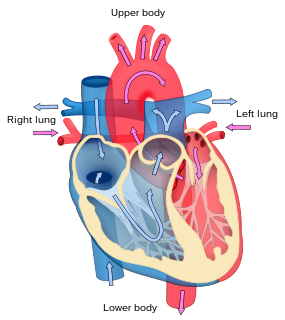
Cardiology is a branch of medicine that deals with the disorders of the heart as well as some parts of the circulatory system. The field includes medical diagnosis and treatment of congenital heart defects, coronary artery disease, heart failure, valvular heart disease and electrophysiology. Physicians who specialize in this field of medicine are called cardiologists, a specialty of internal medicine. Pediatric cardiologists are pediatricians who specialize in cardiology. Physicians who specialize in cardiac surgery are called cardiothoracic surgeons or cardiac surgeons, a specialty of general surgery.

The American Heart Association (AHA) is a nonprofit organization in the United States that funds cardiovascular medical research, educates consumers on healthy living and fosters appropriate cardiac care in an effort to reduce disability and deaths caused by cardiovascular disease and stroke. Originally formed in New York City in 1924, it is currently headquartered in Dallas, Texas. The American Heart Association is a national voluntary health agency.
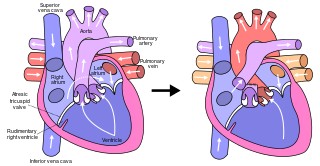
The Fontan procedure or Fontan–Kreutzer procedure is a palliative surgical procedure used in children with univentricular hearts. It involves diverting the venous blood from the inferior vena cava (IVC) and superior vena cava (SVC) to the pulmonary arteries without passing through the morphologic right ventricle; i.e., the systemic and pulmonary circulations are placed in series with the functional single ventricle. The procedure was initially performed in 1968 by Francis Fontan and Eugene Baudet from Bordeaux, France, published in 1971, simultaneously described in 1971 by Guillermo Kreutzer from Buenos Aires, Argentina, and finally published in 1973.

Helen Brooke Taussig was an American cardiologist, working in Baltimore and Boston, who founded the field of pediatric cardiology. She is credited with developing the concept for a procedure that would extend the lives of children born with Tetralogy of Fallot. This concept was applied in practice as a procedure known as the Blalock-Thomas-Taussig shunt. The procedure was developed by Alfred Blalock and Vivien Thomas, who were Taussig's colleagues at the Johns Hopkins Hospital.
Paul Dudley White, American physician and cardiologist, was born in Roxbury, Massachusetts, the son of Herbert Warren White and Elizabeth Abigail Dudley. He was one of the leading cardiologists of his day, and a prominent advocate of preventive medicine.

The Johns Hopkins University School of Medicine (JHUSOM), located in Baltimore, Maryland, is the research-intensive medical school of Johns Hopkins University. Founded in 1893, the School of Medicine shares a campus with the Johns Hopkins Hospital and Johns Hopkins Children's Center, established in 1889. Johns Hopkins has consistently ranked among the top medical schools in the United States, in terms of the number of research grants awarded by the National Institutes of Health, among other measures.

Mark E. Josephson (1943-2017) was an American cardiologist and writer, who was in the 1970s one of the American pioneers of the medical cardiology subspecialty of cardiac electrophysiology. His book titled Clinical Cardiac Electrophysiology: Techniques and Interpretations is widely acknowledged as the definitive treatment of the discipline. He was the Herman Dana Professor of Medicine at Harvard Medical School and the director of the Harvard-Thorndike Electrophysiology Institute and Arrhythmia Service. He was also until 2016 the chief of cardiology at Harvard University's Beth Israel Deaconess Medical Center in Boston.

Sivaramakrishna Iyer Padmavati was an Indian cardiologist. She was director of the National Heart Institute, Delhi, and the founder president of the All India Heart Foundation. The institute collaborates with the World Health Organization (WHO) in training students in preventive cardiology. Padmavati was awarded India's second highest civilian honour, the Padma Vibhushan in 1992. Padmavati, an elected fellow of the National Academy of Medical Sciences, was the first woman cardiologist in India and established the first cardiac clinic and cardiac catheter lab in India.
Barry A. Love M.D. is a cardiologist specializing in pediatric and congenital heart problems.

Jane Somerville is a British emeritus professor of cardiology, Imperial College, who is best known for defining the concept and subspecialty of grown ups with congenital heart disease (GUCH) and being chosen as the physician involved with Britain's first heart transplantation in 1968.
Charles E. Mullins is a retired pediatric cardiologist who practiced at Baylor College of Medicine and Texas Children's Hospital. He is known for advancing cardiac catheterization techniques to treat congenital heart defects, and has been referred to as the father of modern interventional pediatric cardiology.
Richard Starr Ross was an American cardiologist and served as Dean of Johns Hopkins University's School of Medicine from 1975 to 1990. He examined Richard M. Nixon for the Watergate investigation.
Edwards A. Park was a American pediatrician who established the pediatric heart disease clinic at the Johns Hopkins Hospital, along with other pediatric subspecialties. During his career, Park was the Chief-of-Pediatrics of the Harriet Lane Home for two decades, as well as a well-published researcher on medical conditions such as rickets and lead poisoning. The contemporary pediatric department at Hopkins is still regulated in the same way that Park had once established. The Edwards A. Park Scholarship Fund at Johns Hopkins was built under his name upon his eightieth birthday by friends, colleagues and former students.
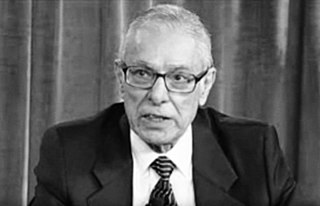
Shahbudin Rahimtoola was a cardiologist based in Los Angeles, United States. He served as Distinguished Professor at the Keck School of Medicine, University of Southern California. Rahimtoola was credited for his contribution to two clinical syndromes namely the hibernating myocardium and 'prosthetic valve-mismatch'.
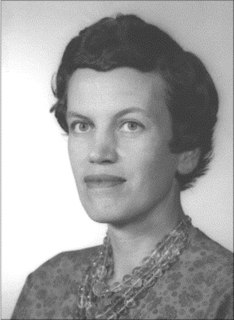
Catherine Annie Neill was a British pediatric cardiologist who spent the majority of her career at the Johns Hopkins Children's Center in Baltimore, where she worked alongside Helen B. Taussig. Her primary interest was congenital heart defects; she discovered one type of defect, scimitar syndrome, in 1960.
Iqbal Mahmoud Al Assad is a physician pursuing a pediatric cardiology fellowship at Boston Children's Hospital. She was recognized as one of the youngest doctors in the world when she completed her medical training at age 20. Her name is also seen as Iqbal El-Assaad in some sources.
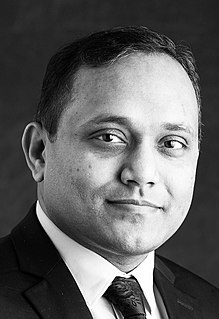
Shelby Kutty is an Indian-born American cardiologist, a professor of pediatrics and internal medicine at the Johns Hopkins University School of Medicine. He holds the Helen B. Taussig endowed professorship at Johns Hopkins and is Director of the Helen B. Taussig Heart Center at the Johns Hopkins Hospital. Prior to this, he held the title of assistant dean for research and development and vice chair of pediatrics at the University of Nebraska Medical Center College of Medicine.

Johns Hopkins Children's Center (JHCC) is a nationally ranked, pediatric acute care children's teaching hospital located in Baltimore, Maryland, adjacent to Johns Hopkins Hospital. The hospital has 196 pediatric beds and is affiliated the Johns Hopkins School of Medicine. The hospital is the flagship pediatric member of Johns Hopkins Medicine and is 1 of 2 children's hospital in the network. The hospital provides comprehensive pediatric specialties and subspecialties to infants, children, teens, and young adults aged 0–21 throughout Baltimore and the wider United States. Johns Hopkins Children's Center also sometimes treats adults that require pediatric care. Johns Hopkins Children's Center also features one of the only ACS verified Level 1 Pediatric Trauma Centers in the state. The hospital is directly attached to Johns Hopkins Hospital and is situated near the Ronald McDonald House of Maryland.
Paul M. Weinberg was Professor of pediatrics at the University of Pennsylvania School of Medicine and a pediatric cardiologist at the Children's Hospital of Philadelphia. He was internationally known for his contributions to pediatric cardiology education and the pathology of congenital heart disease.
The Children's Cardiomyopathy Foundation (CCF) is a national 501(c)(3) nonprofit organization focused on the pediatric forms of cardiomyopathy, a rare and chronic heart condition. Founded in New Jersey, CCF has grown into a global community of families, physicians, and scientists focused on accelerating the search for causes and cures for pediatric cardiomyopathy through increased research, education, awareness, and advocacy. The organization also provides support and resources to affected children and their families.












